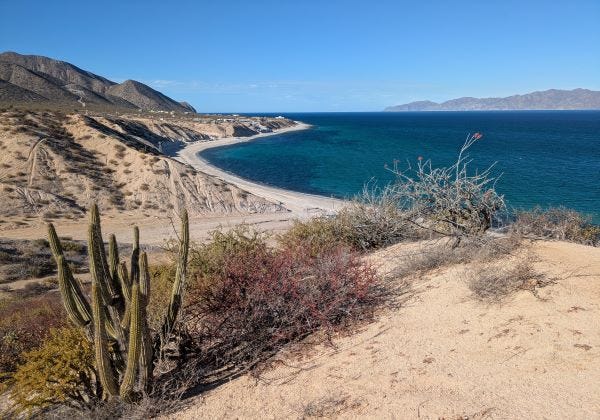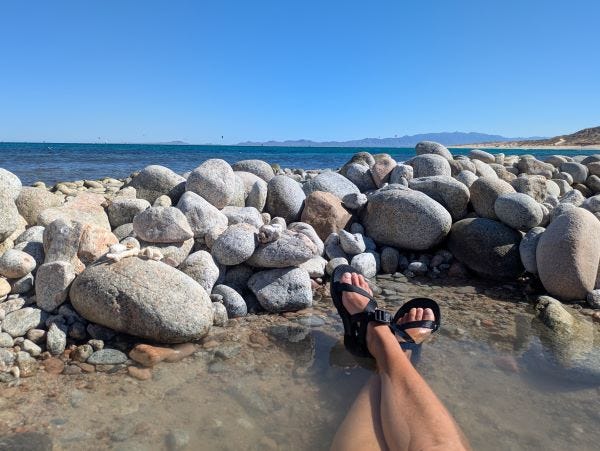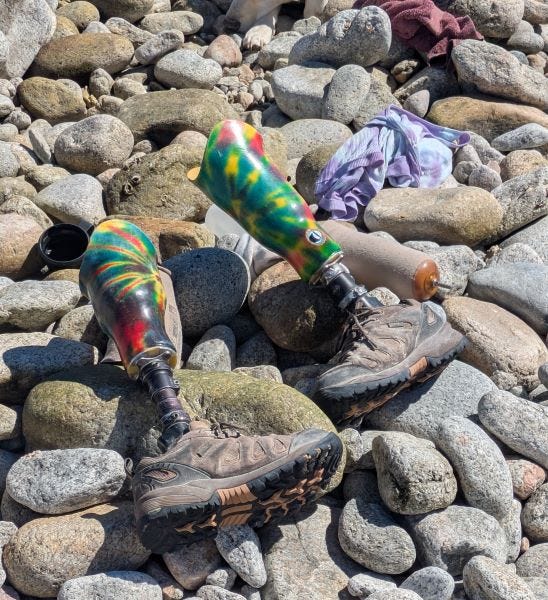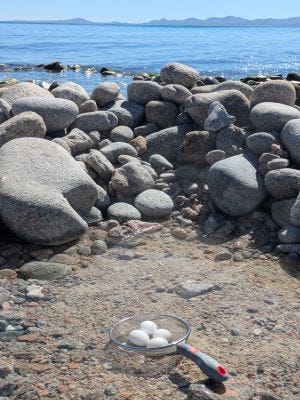The shoreline was a jumbled maze of a dozen individual rocky pools. Previous beachgoers had stacked soft-sided boulders into stubby walls around each of the thermal bubblers in an attempt to capture most of the hot fresh water, while keeping most of the cooler salt water at bay. Some pools resembled a twin waterbed, just big enough for one person to lay in the shallows. Others mirrored the effect of an aquatic round table for six, room for a group of friends to sit and soak in the novelty of hot springs on the edge of the sea.
After a long and somewhat stressful afternoon of struggling with Walter, our big yellow truck, on several different fronts, we were beyond ready to relax in a natural Jacuzzi. I picked my way across the rocks between the different pools, suspense building like an enticing game of Duck, Duck, Goose. I dipped a toe in each one, searching for a pool that was hot. Warm, warm, warm, warm, warm, warm . . . we struck out.
Hot springs should be hot.
Typical for the February Baja desert, as the sun sunk toward the horizon, the air temperature dropped dramatically. Tepid pools would not be enough.
We’d heard great things about these hard-to-reach thermal springs. Oh, well. We resolved to camp for the night and move on in the morning. Baja is truly stunning and gracious and full of magical surprises, and we have had a marvelous couple of months here, but you can’t win them all, right?
Later that evening, however, we learned from other campers parked there that we’d simply made a logistical error. We had tested the pools with the tide in, when too much cool seawater is able to infiltrate the walls. The tide was high; we would hold on—until the water level receded. I’m not the kind of girl who’d give up just like that. Oh, no. (Those of you who remember Blondie’s biggest 1980 hit will understand, *wink*.)
By late morning the next day, those geothermal springs just north of El Sargento in Baja California Sur were at their finest—which is pretty amazing, to be honest. They were so hot in some spots, in fact, that we needed to exercise caution, dipping a fingertip before committing a whole tender bare foot. Apparently third-degree burns are not uncommon here, if one makes the mistake of stepping in the wrong spot at low tide.1
Like Goldilocks’ lesser-storied trip to the beaches of Southern Baja, I searched until I found a pool that was just right. After selecting the perfect boulder for a pillow, I relaxed into the lovely water, listening to the little waves crashing softly beyond the rocks and admiring the sea’s striations of deep blue, teal, and purple; the specific shades difficult to define by my childhood knowledge of Crayola’s 64-pack.
As I soaked, I glanced down at my sun-kissed legs and feet and had to chuckle. My Southern California-based, beach-obsessed, boy-conscious teenage self would not have approved. They were far from the perfection we demanded of ourselves then. Stubble and bruises, dry skin, misshapen and unpolished toenails. I shook my head. No. I would never have left the house in shorts, looking like that. My legs and feet had to be silky smooth, well-manicured, and completely unblemished back then. All of ours did. Anything less than perfect—at least perfect the way our specific subculture defined it—was subpar, unacceptable, unworthy. I mentally patted myself on the back for eventually growing beyond that limited mindset.
Then, at midday, I met a man with no legs at all.
I had watched him stroll up the beach to the hot springs earlier, unfasten his tie-dye prosthetics with the detachable thigh extenders at one end and the hiking boots on the other, pull the pieces out from under his baggy cargo shorts, then set them aside and use his arms to position himself in the steaming water.
With the speed of a muscle-spasm, my mind flashed back to the jokes we—I—told in junior high school.
What do you call a man with no arms and no legs at your front door?
Matt
What do you call a man with no arms and no legs in a swimming pool?
Bob
What do you call a man with no arms and no legs in a hot tub?
Stew
Ew.
I felt myself physically flinch as I mentally cringed. So crude. So cold. So entirely unbefitting of a person who tries to live like Jesus taught. We thought we were clever and funny. It hadn’t occurred to us then that our so-called jokes referenced real human beings—fellow divine image-bearers deserving of dignity—actual people with lives and feelings, struggles and joys. Like AI minions, we just repeated what we’d heard others say, categorizing and disparaging whole groups of people without thought of their individuality, simply for our own entertainment. Somehow, we assumed the jokes were justified simply because we weren’t the first to say them.
Perhaps we might have reconsidered our distasteful witticisms if we perceived they would hurt someone we knew personally, if said to their face or in their presence. But we didn’t.
I watched as the man with no legs reinforced the sides of his chosen pool, lifting large, smooth rocks into place and plugging holes with smaller ones. He was strong, capable, intelligent—a problem solver rather than a complainer. We exchanged occasional pleasantries as we soaked in adjacent pools. He’s been camping in a small trailer with his dog, just down the shoreline, for the last two months, and he comes to soak in these pools daily.
As the day progressed, the sun beat down, and the cool water receded; it was essential to continue moving further and further from shore to find pools comfortable enough for soaking. I mentioned I was going to choose a different one. He nodded with a sad smile.
“I’d like to move out to that pool there.” He pointed to a single lane spot at the edge of the sea. “That’s my favorite one at this time of day, but it takes me so long to put my legs back on.” Glancing back toward land as two more vehicles pulled into the sandy parking area, he continued. “Someone always beats me to it.”
I nearly choked on the familiarity to a story from John’s account in the Bible. A man without working legs wanted to get into a pool because the waters had changed, but his condition made him too slow, so someone always got there ahead of him.2
Eyeing the recently arrived families gathering their towels and water bottles and smearing sunscreen on their children, I offered to hold the spot he preferred until he could get there. He gratefully accepted, then pulled himself out of the water and began drying off the stumps of his thighs so he could begin the tedious process of putting on his legs. Once all the pieces were attached, he pushed himself to his feet, reached back down to gather his belongings, called for his dog to follow, and gingerly walked out to where I stood—checking his footing carefully on the precarious piles of rocks. Successful, he sat down, removed his legs again, set his belongings on dry rocks, and maneuvered himself back into the water.
I chose another available spot nearby and pondered what I’d just witnessed—a man I would have initially thought was disabled because his legs don’t work like mine. But I observed and learned better. He isn’t unable to get around on his legs, even though two-thirds of them are made of something other than flesh and bone. He isn’t unable to drive his truck and trailer and camp on the beach for weeks on end. He isn’t unable to tote his belongings around or care for his dog. He isn’t unable to assess the changing tides, or stack the stones, or do any of the things required to enjoy the hot springs on the edge of the Sea of Cortez on a sunny day in February. He’s just a little slower at switching pools than most of us with two standard-issue legs.
My holding a place for him while he put on his legs was not a handout or a privilege he somehow didn’t deserve. It was just a simple act of equity, a way to level the playing field so he had the opportunity to do what he was entirely capable of doing.
The tide slowly rolled back in. Just before sunset we packed up and moved on to our next campsite, the side yard property of some local folks nearby we’d met in a grocery store parking lot a couple weeks prior. After we got settled, the five of us walked together to a nearby restaurant to get better acquainted. Between our broken Spanish and their broken English, we enjoyed a couple hours of conversation and laughter. Our language abilities were less than perfect, but we were not incapable. Between us, we managed to work together despite our brokenness and function as if we were whole.
Our new friends explained to us the intricacies of Mexican politics and the role of the cartels. Their new president, Claudia Sheinbaum, is the first female to ever hold that office. Since her inauguration only three months ago, she has proven to be one of the most popular and effective leaders in the nation’s history, currently enjoying a well-earned 87% approval rating. The cartels are still very powerful, but they are being forced to clean up their tactics a bit under Claudia’s policies and enforcement. The area where new our friends live—where we are currently camped—is a reliably peaceful place because many high-ranking cartel members themselves own homes there and they want it to be a consistently safe place for their families. If anyone causes trouble here, they are met with swift retribution. Fascinating stuff.
The diverse ethnicities, languages, backgrounds, and worldviews of people we encounter as we travel is refreshing, invigorating. It makes us feel alive, like archaeologists on a dig, exploring and uncovering things about the world we could have never known had we not left our comfort zones. As we meet people different from us, we include them in our circle of friendship, and they include us in theirs—and we are all richer for it. It’s a little foretaste of Heaven, with its promise of global representation of all peoples.3
It makes me terribly sad that things like diversity of culture and ethnic background, equity of opportunity for those who simply need a minute to put on their legs, and inclusion of others different from us have become fighting words—divisive concepts that inspire people to create tasteless memes and crack crude jokes. It’s enough to make my heart hurt.
But here is the good news, friends: Some things are not yet divisive, even in this terribly polarized and tribalized United States.
Kindness
Joy
Faithfulness
Patience
Love
Peace
Self-control
Goodness
Gentleness4
These things, practiced by individuals, are not being debated in the courts of law or even the courts of public opinion. There are no laws prohibiting them. Nothing takes away our right to put them into practice, and no ugly memes or crude jokes can diminish their power.
Like a Golden Retriever desperately wanting some pets and scritches, can we lean hard into these things with all our weight, friends? And maybe, just maybe, as we lean into that list, we might find that embracing diversity, seeking equitable treatment for those who just want the same opportunities we already enjoy, and including those different from us at the table to make sure all have a voice, will naturally flow in and out of our lives like the tide.
Remember, friend, the man with no legs I met at the hot springs in Baja. I know I will. Consider how you can hold space for others who just need a minute to put their legs on.
And really—can we all cut out the crude, cruel, and hurtful jokes, memes, and mean-spirited snide comments about people who are different from us? They’re not attractive. And even if their intended targets never hear or see them, they poke our own hearts, hurting us in ways we might not even notice. Let’s focus instead on the list above. Against such things, there is no law.
Until next week,
Sherry
P.S. Last week was amazing, friends. You came through. The car repair was fully funded, plus a little more, within only a few days. Thank you. Check out the post (and the footnote) here.
For the story of the paralyzed man in John’s Gospel, check out John 5. Here’s a preview to show you why I was so struck by the similarities.
The world traveler and student of intercultural studies in me loves this passage from the book of Revelation—part of the Apostle John’s vision of what Heaven is like.
According to the Bible, these are observable characteristics that show the Spirit of God is at work in a person’s life. They are listed in their more familiar order in the Apostle Paul’s letter to the Jesus-followers in the city of Galatia. You can read it in all its brevity here. Let’s plant whole orchards of these fruits.









Good "perspective" story!